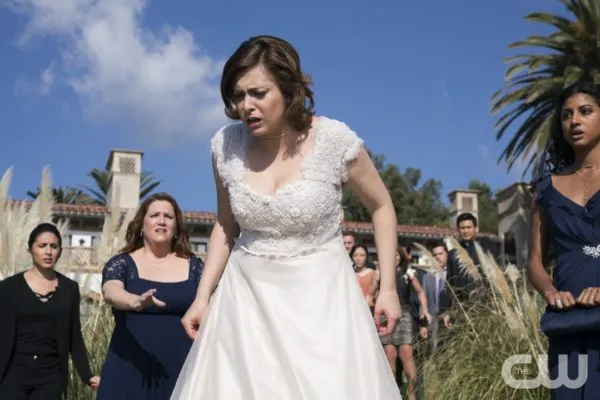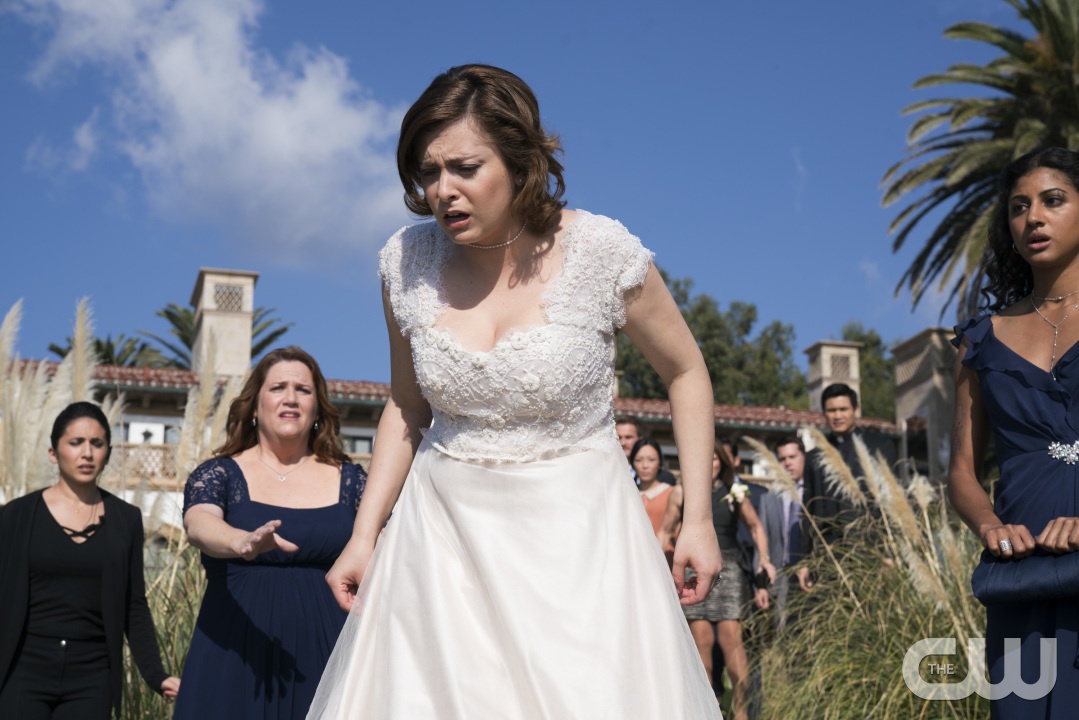
Note: spoilers ahead.
The CW comedy “Crazy Ex-Girlfriend” only turned up the intensity and the emotion during season two. Now, if you haven’t reached the last episode of the season, I highly suggest you watch before proceeding.
Good? Good.
Let’s break down that final scene of the last episode. After learning that Josh Chan (Vincent Rodriguez III), the man she quit her job and moved halfway across the country for, runs off to become a priest and leaves her at the altar, Rebecca Bunch (Rachel Bloom) runs to the edge of a picturesque cliff and peers over the edge, wobbling precariously. Rebecca’s best friend, Paula (Donna Lynne Champlin), begs her to step back, but Rebecca can’t bring herself to do it. She can’t.
The arc of the season and even the series itself has been interwoven with plot points relevant to concerns of working individuals, especially women, today. A well-educated woman, Rebecca wants to have it all — a good job, a stable relationship and a group of close friends, but according to “Crazy Ex-Girlfriend,” the world won’t let her have it. Her job is dominated by a mansplaining boss who is desperate to please his father and become economically profitable, her relationships are troubled by a desire to return to childhood happiness, and there is a changing state of group dynamics as her friends find other friends and grow apart.
But deep down, what really plagues her are suppressed mental health issues, flattened by familial pressure to conform and succeed. This is ultimately the crux of “Crazy Ex-Girlfriend” and can certainly speak to millennials, college students and others who feel the need to work increasingly hard in an increasingly competitive world. Rebecca does not want to face the fact that her life is not going the way it wants to. Much of the comedy on the show even comes from the fact that Rebecca’s work, love and social lives are utterly disastrous. In a wild season one dream sequence, Rebecca confronts the reality that she really loved performing, and she suppressed the desire to pursue this in favor of studying law, which she excelled at and with which she could earn a fantastic salary. This is never spoken of again in season two, which was slightly disappointing, but this is both justification for why the show is a musical comedy — the songs are simply sequences that Rebecca imagines in her head as elaborate musical numbers — as well as why she is so unhappy. Rebecca Bunch, without a doubt, reflects so many of us: desperate to seek happiness in all aspects of our lives, yet in some way, unable to fulfill it all.
Rebecca does see a therapist but refuses to do anything that the therapist tells her, effectively rendering her useless. Her behavior is impulsive and worrisome — so why are we rooting for such an incredibly flawed character? Because I believe that Rebecca, in one way or another, is all of us. When Rebecca is about to step over the edge, I personally had to pause the episode at this moment in order to take a few deep breaths. All that “Crazy Ex-Girlfriend” had planted throughout the season came rushing back, and I found myself realizing that all of Rebecca’s concerns — her desire to succeed at her job and retain close relationships — in one way or another, were a lot like mine.
When “Crazy Ex-Girlfriend” took that step to have Rebecca consider suicide in that moment, it at first seemed like a lot. But looking back, it was neither a gimmick nor an inappropriate moment to do this. I’m no expert, but slowly introducing individuals to seeing a character onscreen who approaches life with zest and spirit but still struggles to keep herself afloat emotionally, has an incredible impact. “Crazy Ex-Girlfriend” approaches this issue with this concern with grace and delicacy, addressing an issue that honestly, few people want to talk about. Rebecca’s mental health is neither glamorized nor used as a tool in the show. Instead, it is masked like many choose to do in real life, telltale signs ignored. Maybe putting relatable characters onscreen and addressing real concerns in this manner can bring light to serious concerns about all of our emotional wellbeing like “Crazy Ex-Girlfriend” is a useful tool. Because, of course, people like TV.
Contact Olivia Popp at opopp ‘at’ stanford.edu.
